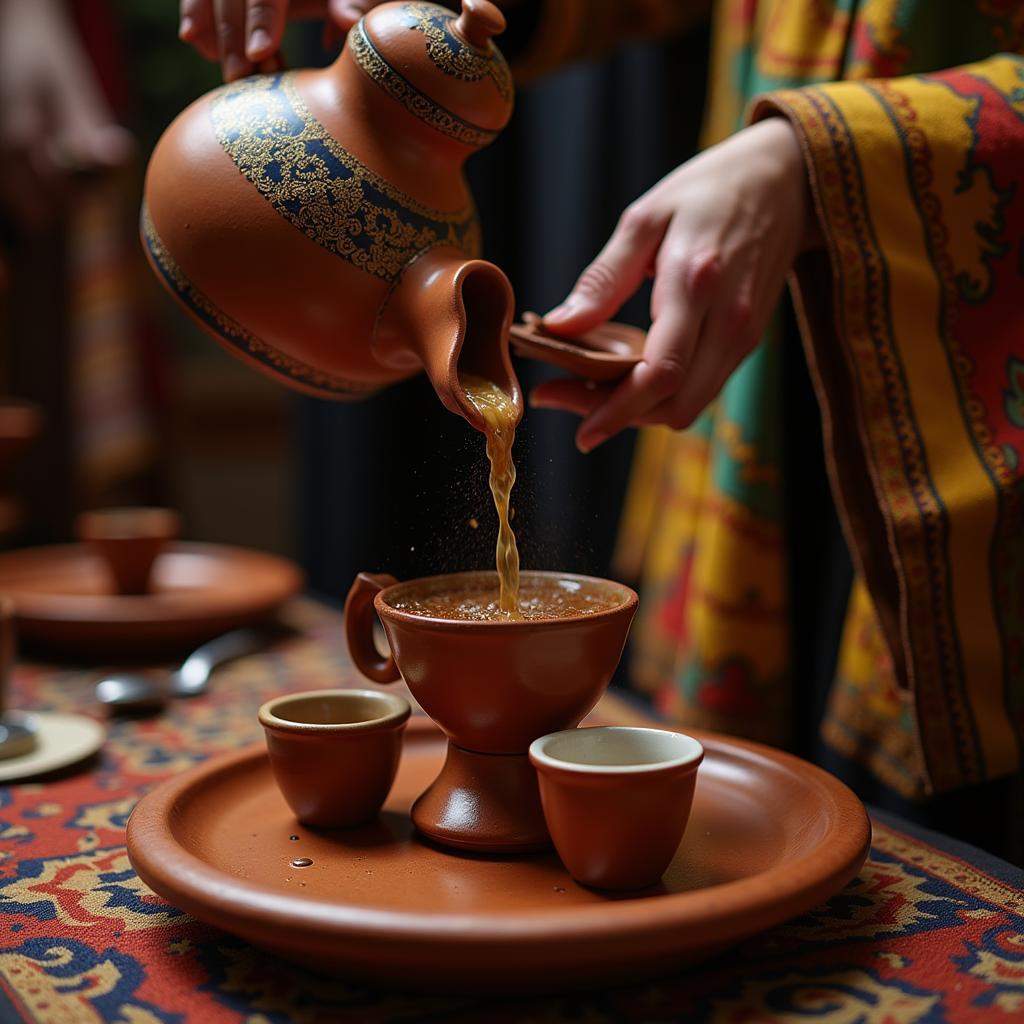The African Coffee Tree: A Bean-to-Cup Journey
The enticing aroma of freshly brewed coffee, a staple in many morning routines, finds its origin in the heart of Africa. The African Coffee Tree, more than just a plant, represents a rich history, vibrant culture, and a source of livelihood for millions. This journey delves into the fascinating world of African coffee, exploring its origins, cultivation, and global impact.
From Ethiopia to the World: Uncovering Coffee’s Roots
The story of coffee begins in Ethiopia, where legend has it that a goat herder named Kaldi discovered the energizing effects of coffee berries. Intrigued by his goats’ unusual alertness after consuming berries from a particular tree, Kaldi shared his findings with local monks. They, in turn, experimented by creating a beverage from the roasted beans, marking the birth of coffee as we know it. From these humble beginnings, coffee cultivation spread throughout the African continent, each region developing its unique methods and traditions.
A Diverse Landscape: Exploring African Coffee Varieties
Africa boasts a diverse range of coffee species and flavors, each region contributing unique characteristics to the global coffee palate. Ethiopian coffee, known for its bright acidity and floral notes, remains highly sought after by connoisseurs. Kenyan coffee offers a full-bodied taste with blackcurrant undertones, while Tanzanian beans are prized for their balanced flavor profile. Further west, countries like Côte d’Ivoire and Uganda produce Robusta coffee, recognized for its higher caffeine content and bolder taste. This incredible diversity ensures a flavor profile to satisfy every coffee lover.
 Traditional African Coffee Ceremony
Traditional African Coffee Ceremony
More Than Just a Drink: The Cultural Significance of Coffee
In many African cultures, coffee transcends its role as a simple beverage. It serves as a symbol of hospitality, community, and tradition. The traditional Ethiopian coffee ceremony, for instance, is an elaborate ritual that brings people together. From roasting the green beans to meticulously brewing the coffee in a jebena, every step is imbued with cultural significance. The aroma fills the air, inviting conversation and fostering connections. Similarly, in many East African communities, sharing a cup of spiced coffee brewed with ginger and cardamom is a gesture of welcome and respect.
Cultivating Excellence: Sustainable Practices in African Coffee Farming
As the demand for sustainably sourced coffee increases, many African coffee farmers are embracing eco-friendly practices. Shade-grown coffee, where coffee trees thrive under a canopy of indigenous trees, promotes biodiversity and conserves water. Additionally, organic farming methods, which avoid the use of synthetic pesticides and fertilizers, are gaining traction, ensuring the well-being of both the environment and coffee farm workers. These efforts not only protect the delicate ecosystems of coffee-growing regions but also enhance the quality of the coffee beans.
From Bean to Cup: A Journey of Care and Craftsmanship
The journey of African coffee from bean to cup is a testament to the dedication and skill of countless individuals. After harvesting the ripe coffee cherries, farmers carefully process the beans using traditional methods like sun-drying or washed processing. The beans are then meticulously sorted, graded, and roasted to perfection, unlocking their unique flavor profiles. Whether enjoyed as a single-origin brew highlighting the distinct characteristics of a particular region or as a blend combining the best of African coffee varieties, each cup represents a remarkable journey.
Conclusion
The African coffee tree is much more than just a source of caffeine. It represents a rich tapestry of history, culture, and sustainable practices. From the highlands of Ethiopia to the bustling markets of Tanzania, the journey of African coffee captivates the senses and leaves a lasting impression. So, the next time you savor a cup of African coffee, remember the legacy of this remarkable bean and the vibrant continent it calls home.
FAQs about African Coffee Trees
1. Where did coffee originate?
Coffee is believed to have originated in Ethiopia, with legends tracing its discovery to a goat herder named Kaldi.
2. What are the different types of coffee beans grown in Africa?
Africa is known for producing both Arabica and Robusta coffee beans. Arabica beans, prized for their flavor, are commonly found in East African countries like Ethiopia and Kenya. Robusta beans, with their higher caffeine content, are prevalent in West African nations like Côte d’Ivoire.
3. Why is African coffee considered special?
African coffee is renowned for its diverse flavor profiles, ranging from bright and citrusy to rich and chocolatey. The varying climates, soil conditions, and processing methods across different African countries contribute to this unique diversity.
4. Is African coffee sustainably sourced?
Many African coffee farmers are increasingly adopting sustainable practices, such as shade-growing and organic farming, to protect the environment and ensure the long-term viability of their crops.
5. How can I support African coffee farmers?
You can support African coffee farmers by purchasing coffee from reputable brands that prioritize fair trade practices and direct sourcing. Look for certifications like Fairtrade, Rainforest Alliance, and UTZ, which indicate ethical and sustainable production.
Looking for more information on the diverse cultures and flavors of Africa? Explore these related articles:
- Indulge your sweet tooth with these delectable African cake recipes.
- Discover the vibrant flavors of East African cuisine with this insightful guide to African eastern deira.
- Learn about the fascinating countries that make up the African continent with this comprehensive list of African country names in alphabetical order.
Let us know if you have any questions. Contact us at +255768904061, email us at kaka.mag@gmail.com, or visit our office in Mbarali DC Mawindi, Kangaga, Tanzania. Our customer service team is available 24/7 to assist you.

